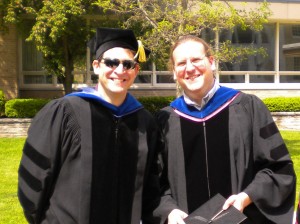As you know (or should know), an “inferior” good is one where as my income increases, the demand for the good decreases. My in class examples of inferior goods are typically things like Ramen noodles, hot dogs, bus rides, and Irish potatoes back in the day.
In a stroke of WT-you-know-what, John Burger and Stephen Walters from Loyola University in Maryland add the World Series to the list.
You can’t be serious?
Indeed. And, here’s the abstract from their paper in Economic Letters:
World Series telecasts are now an inferior good. Income and the time cost of consumption interact so that a ten percent income increase reduces viewership by 1.8 million households. Increased availability of substitutes reduces ratings but increased drama improves them.
Now why would that be? Is it because the proliferation of substitutes over the years (more cable television options in November).
Look for this in Econ 300 next year.






 Don Gerard
Don Gerard A bit more on the potential NFL strike — my friend and colleague,
A bit more on the potential NFL strike — my friend and colleague,